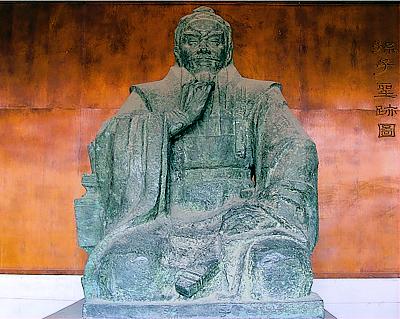Wargaming through the Eyes of Sun Tzu

This is the third in a series of examinations of how traditional military thinkers can help us as players of various types of wargames. The idea of these articles is to provide both new and veteran players with sage advice that has echoed down the ages and still influences modern tactical, strategic, and logistical thinking.
Perhaps one of the most influential masters of war in recorded human history, the warrior philosopher Sun Tzu has a great deal that he can teach us about the art of war. Granted, many of us own copies of the famous book, but often I hear that the tenets of this tome are difficult to grasp. Partly that is a fault of the translators, but mainly it is because the poetic language of the author makes interpretation of the greatest general of the Kingdom of Wu complicated at best. Let’s take a look at the warrior poet’s thoughts.
“Be extremely subtle, even to the point of formlessness. Be extremely mysterious, even to the point of soundlessness. Thereby you can be the director of the opponent’s fate.”
And here we have a prime example of poetic language obfuscating a simple truth. If your opponent does not know or understand your motives and conceptualizations, he cannot defend against you. Now, there is a time honored tradition of sharing your list with opponents for a reason, but the sharing of the lists and explanation of units is not the same as a full on explanation of your tactics. Remember that the uses that you put units to do not necessarily have to be the most obvious based on the easily foreseen permutations of the unit in question.
“Confront them with annihilation, and they will then survive; plunge them into a deadly situation, and they will then live. When people fall into danger, they are then able to strive for victory.”
Even the most direly outnumbered and surrounded squad can be dangerous. While the statisticians will state that X shots will equate out to Y kills, the simple luck of the dice can mean that fortune selects the strangest circumstances to exert its influence on the battlefield.
“Hence that general is skilful in attack whose opponent does not know what to defend; and he is skilful in defense whose opponent does not know what to attack.”
While the language is kind of cryptic, the point of this statement is thus: A commander who obscures his true target will deny his opponent the opportunity to defend the right target with all his strength, and the commander who does not reveal his truly important asset forces opponents to waste their offensive power against multiple defensive positions. Keep this in mind when dealing with an opponent who seems to be moving in ways that imply multiple threats.
“If you know the enemy and know yourself you need not fear the results of a hundred battles.”
While this is not always practicable advice, it is important to study the opposition as thoroughly as you can. In the tournament scene, this means studying the actions and attitudes of previous winners, as well as known losers. In the local scene it means knowing the preferences and proclivities of your colleagues, and studying their methods. Knowledge is power, but be careful for it can lead to assumption.
“Pretend inferiority and encourage his arrogance.”
Important advice in any game, but this stratagem is especially useful against an overeager opponent. Luring an opponent into an ambush in a wargame is never easy, but it can be done. Transparency of army builds (i.e. showing your opponent your lists and he showing you his) means that it is difficult to surprise him with army composition or unit strength, however suitably aggressive opponents can be drawn into positions that they think will grant them advantage to exploit a problem that they believe to be part of your defensive posture. Of course, smashing them flat when they are in the killing field is always fun.
“The opportunity to secure ourselves against defeat lies in our own hands, but the opportunity of defeating the enemy is provided by the enemy himself.”
No matter how much you try, how many plans you make, or how often you attempt to put together a stratagems you employ, you can only succeed or fail based on the actions of your opponent. If your opponent does not fall into the trap that you set then you cannot exploit that benefit, where if he does fall in that trap they may or may not survive depending on their actions. Good generals seek to allow the opportunity for an opponent to defeat themselves through action or inaction, and never assume an opponent will.
“Thus, what is of supreme importance in war is to attack the enemy’s strategy.”
While one must obviously engage an opponent’s forces, the ideal way to do so is to fight in a manner that undermines your opponent’s overall strategy. If your opponent is looking to commit an Alpha Strike, do not give him a target. If your opponent is relying on units entering the battlefield from unexpected directions, do what you can to make those applications difficult.
“You have to believe in yourself.”
It is a sad truth that most of the games that I have observed start with a player already defeated before units are deployed and the dice thrown. Many times just seeing an opponent’s list is enough to cause despair in a player. This is something to be avoided at all costs. No opponent is unbeatable, no list is insurmountable, and no engagement is certain in its execution
Tactics and Stratagems of the Warmaster of Wu
The Stalking Horse
While we do not know a lot about the battles fought and won by the famous Sun Tzu, we do know of the stratagem commonly referred to as the Stalking Horse, which originated with this sly fellow. The purpose of the Stalking Horse is to place a bait unit in a position that the opponent can easily exploit. The Stalking Horse is a trap, though, and will cost the unwary opponent more than they will gain. In most wargames, these will appear as high-value tar-pit units, but it could also be any sacrificial unit placed in a position that a canny general can turn to advantage. Be careful, though, because a target of opportunity left out by your opponent could equally be a Stalking Horse.
Next Week: Ferdinand Foche





